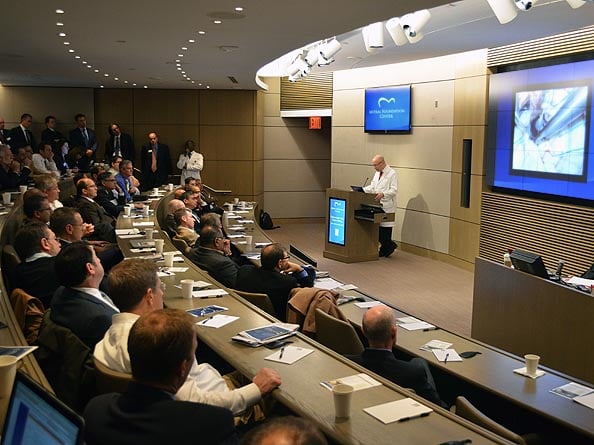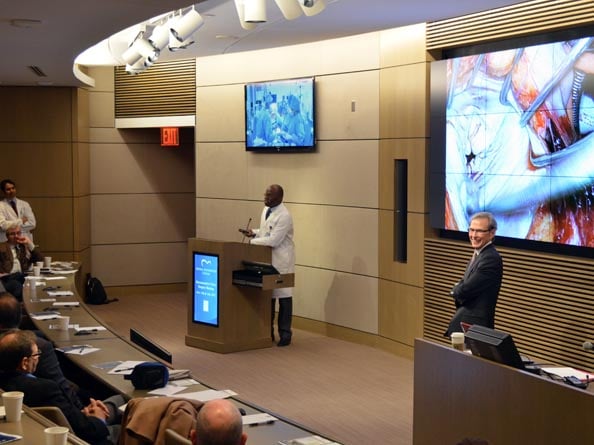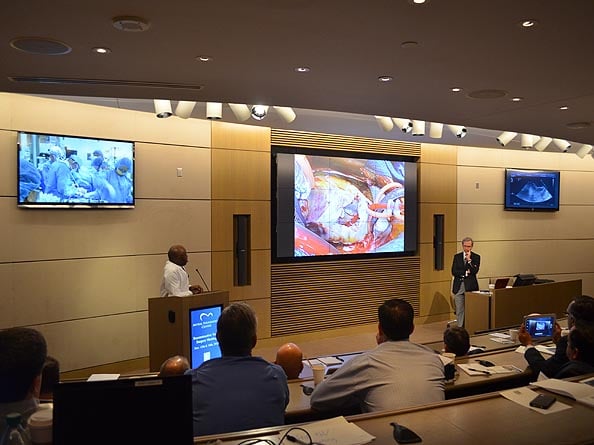Mitral Foundation Center
A few decades ago, surgeons who wanted to learn to perform mitral valve reconstruction—a particularly complex and difficult procedure—most often traveled to a small amphitheater in Broussais Hospital in Paris to witness live operations by the father of mitral valve reconstruction, Dr. Alain Carpentier. Good notes and a sharp memory were the only ways to record the details of the surgery – in the beginning there wasn’t so much as a VHS tape available demonstrating mitral valve repair.
Two decades later, Dr. David H. Adams collaborated with the eminent French surgeon on the invention of landmark mitral valve reconstruction technologies, and together with fellow Mount Sinai surgeon Dr. Farzan Filsoufi, have written the definitive textbook in the field, Carpentier’s Reconstructive Valve Surgery. Dr. Adams and his team have also now accumulated the largest video library in the world of advanced techniques in mitral valve reconstruction, hoping to carry on the legacy of Professor Carpentier’s landmark educational programs.
Education Cornerstone
The mitral valve teaching video library is one component of a much larger initiative: the Mitral Foundation Center.
The Mitral Foundation Center is a hub of teaching and training, as well as documenting and disseminating information about mitral valve repair. The Mitral Foundation Center is the cornerstone of the Mitral Foundation, made possible by a generous gift from Anke and Jürgen Friedrich through their JAF Foundation.
The Mitral Foundation Center is a natural extension of Dr. Adams’s international leadership in the field of mitral valve reconstruction. Dr. Adams and his team perform more than 400 mitral valve repair surgeries annually with a repair rate of nearly 100 percent in patients with degenerative mitral valve disease, which places them among the world leaders in the field.
Closing the Practice Gap
Currently, nearly two million instances of mitral valve disease (damage to the mitral valve that prevents blood from flowing properly through the heart) are diagnosed annually in the United States alone – and approximately 30 percent of the 150,000 patients treated with surgery undergo procedures for replacement, rather than reconstruction.
Why repair instead of replace? In the majority of cases, repair is a more effective solution, and both US and European guidelines for care of patients with mitral valve disease recognize the advantage of repair over replacement, which include decreased risk of stroke and improved long-term event free survival. “This is a serious practice gap,” says Dr. Adams. “We’re in the position not only to help close the gap and increase the repair-over-replacement rate in the US and other parts of the Western world from 70 percent to 90 or 95 percent, but also to advance the field of mitral valve repair significantly on a global scale.”
International Impact
In fact, in developing countries mitral valve disease is the second leading cause of death in children, a result of rheumatic disease. Mount Sinai teams have traveled to Vietnam, Thailand, Indonesia, and other countries to perform life-saving surgeries on patients and to help local hospitals develop their own valve surgery programs. Dr. Adams and his team are planning trips to centers in Colombia and Thailand in the coming year. The Mitral Foundation Center enables Dr. Adams and his colleagues to bring surgeons and physicians from developed and developing countries to New York for training at the Mitral Foundation Center, as well as to provide extensive online programs and resources for remote access from around the world.
“The Mitral Foundation Center is a way we can give back,” says Dr. Adams. “We’re taking in patients from across the country, and we’re also giving something back to the world, extending Dr. Carpentier’s legacy and moving the field of mitral valve repair forward.”
The Mitral Foundation Center consists of a state-of-the-art auditorium with seating for 60, advanced technologies for information sharing, and a translation room (to provide interpretation and translation services to non-English speaking program participants). Resources include the on-line video teaching library; a variety of Web-based training applications, including live and delayed surgery demo downloads for real-time viewing of procedures; videos of conferences and training sessions; and other interactive components.
It Takes a Team
New York-based programs will offer a variety of training opportunities and conferences, including fellowships for doctors to spend several months at Mount Sinai, where collaboration is key. “It takes a great team to provide a superior patient experience,” notes Dr. Adams. “It’s not just a single surgeon. Visiting doctors have a chance to observe our integrated approach to patient care, which is an essential component of our success.” Mount Sinai’s mitral valve team includes echo-cardiographers, anesthesiologists, intensivists, physicians from a number of other specialties, nurses, physician assistants, and a number of other allied health professionals.
Programs and resources available through the Mitral Foundation Center are offered for surgeons and physicians at all levels of experience. “Even the world’s great golf pros retain coaches throughout their careers,” says Dr. Adams. “From surgeons just starting out, to those who want to become super-specialists in mitral valve reconstruction, every physician needs opportunities to continue learning, improving, and innovating.”
For many years, every leader in mitral valve repair attended Dr. Carpentier’s annual “Club Mitrale” in Paris. “Now, it’s our responsibility to continue Dr. Carpentier’s legacy and educate the next generation of mitral valve surgeons,” Dr. Adams insists. With technologies that enable access to the most up-to-date information and resources from virtually anywhere; innovative training programs; and opportunities to experience Mount Sinai’s team approach to mitral valve patient care, the finest education in mitral valve reconstruction in the world is – well, hopefully just a heartbeat away.


